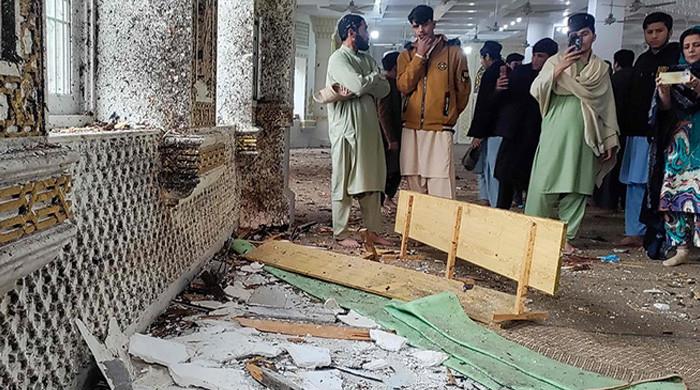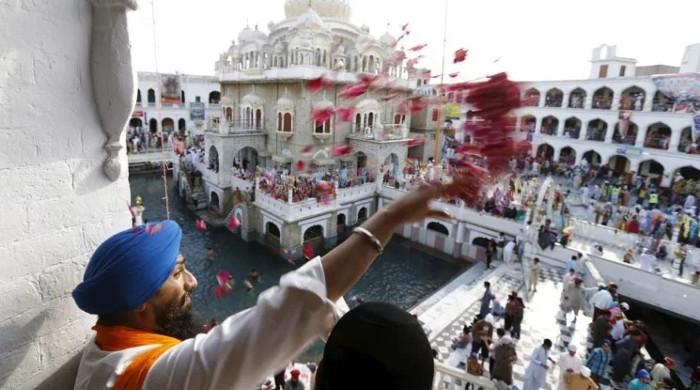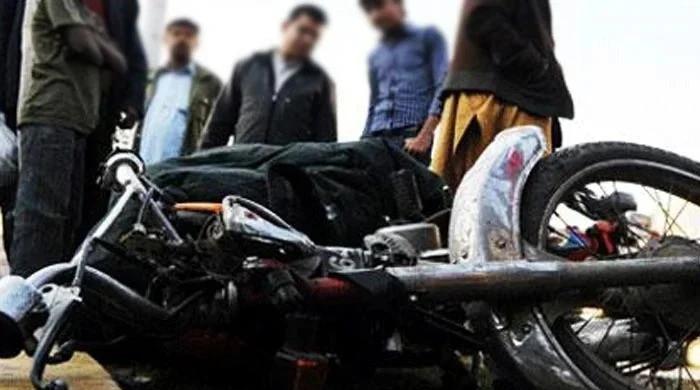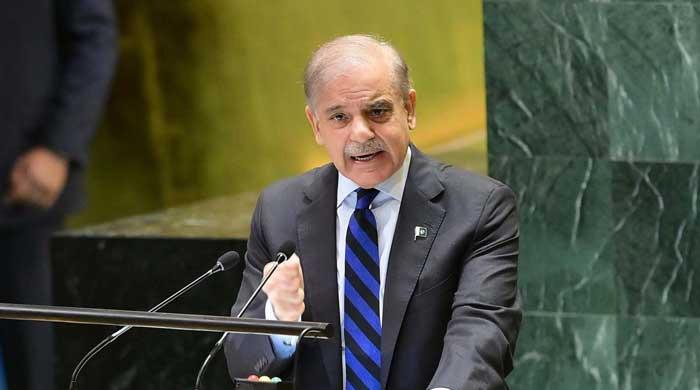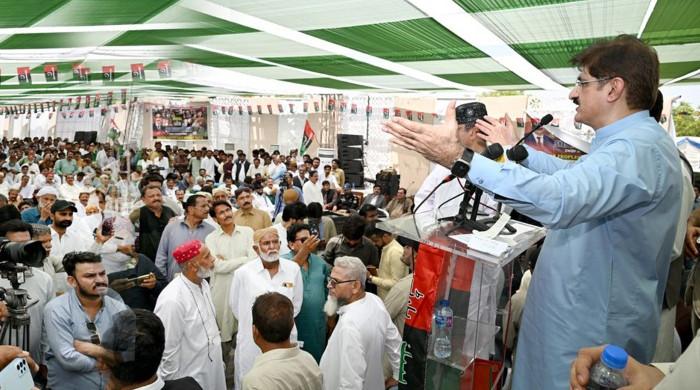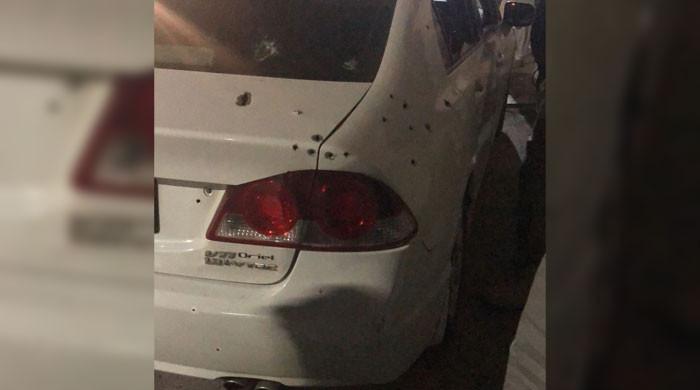If there is one govt not confused, it's Pakistan's: PM Imran on COVID-19 response
"I want to challenge you to point out a single contradiction in my statements since we imposed the lockdown on March 13"
June 25, 2020
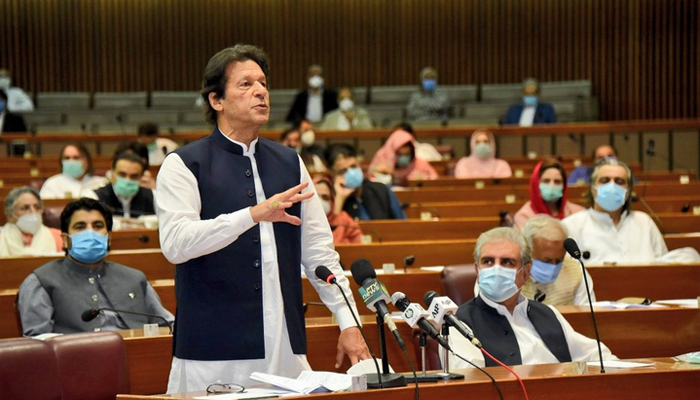
ISLAMABAD: Prime Minister Imran Khan on Thursday made a rare appearance in a session of the National Assembly and defended his government's coronavirus response after it came under criticism from opposition for being "confused".
"We bore a lot of criticism in the beginning to impose a stricter lockdown. There was a lot of pressure on me. From my own people. From my own cabinet to impose something like India," said the premier.
"It is being said again and again that there was confusion [in our coronavirus response]. Mr Speaker, if there was any government in the world that wasn't confused it was ours. Since day one," he added.
PM Imran challenged the opposition to point out a single contradiction in his statements since Pakistan imposed the lockdown on March 13.
"I have always held that if you have Singapore's population, an income of $50,000 per capita, if you have natural social distancing, then the best thing is to impose a curfew.
"I also said that our conditions are such, we have to think of the impact on the poor. These have been consistent statements on my behalf. You have all my speeches on record," he said.
The premier paid special tribute to the National Command and Operations Centre as due to their efforts to establish proper coordination between provinces, Pakistan has data to act on.
"We had no figures previously for how many ventilators exist in Pakistan, how many intensive care beds there are, how much staff is available," he said.
He said that India's example of a failed lockdown policy is being highlighted everywhere, including by New York Times.
PM Imran said as a result, 34% people have been pushed into poverty there. "The poor people have been crushed. There are thousands on the road. Transport has been shut. People have died on the road," he said, to highlight the impact a strict lockdown has had on the poor people in India.
He said even in America, people can see that cases are constantly ballooning and they have had to accept they have to reopen their economies.
"They too are realising that even the world's most powerful economy cannot endure the effects of a lockdown," he said, continuing to defend his government's decision to ease curbs.
"We were the first to talk of a smart lockdown. It was the NCOC," he said.
He said the next phase is a difficult one, with the government challenged to impress upon people the importance of following standard operating procedures.
"We have to provide people a source of income but [...] whenever there are clusters [of people], the disease spreads. We also know that if we do not exercise caution, the existing pressure on hospital will only worsen."
"So whoever is watching, it is incumbent on all of us, to make people realise how important is is to save our elders, the ill, those who have blood pressure and diabetes. The real aim behind a smart lockdown is to protect these people," he said.
The premier also stopped to extend his condolences to the families of the 4,000 people to have died from COVID-19.
"If we exercise caution, our facilities are enough to be able to cope with it," he said, adding regretfully that he receives reports daily of how enough precaution is not being taken.
He reiterated that if people continue to be careful, the month will go by "without any further adverse impacts".
'Govt not hiding behind coronavirus'
The premier also addressed concerns that the government is "hiding behind the coronavirus crisis".
He said the world's economy had suffered a $12.3 trillion setback due to the crisis, quoting figures released by the International Monetary Fund today.
Speaking further of individual economies, he said that England has experienced a 20% shrinkage and its growth has gone into the negative territory. "The whole world is saying that this is the worst economic crisis in a 100 years."
"England has had 40,000 deaths. But the number of deaths have nothing to do with any of this. When you shut down the economy, it does not make a difference how many deaths occur. The point is, what impact does it have on the economy?"
He said there is no telling how much further losses the world's economy will suffer and how long it will take for a full recovery.
"Industries have been shuttered which will never be revived again. The services industry, tourism sector and airlines have all gone into a crisis.
"So I found this idea very strange that we are 'hiding behind the coronavirus crisis'."
'Sick economy'
The prime minister also sought it pertinent to provide a "background" on the kind of "sick" economy that the PTI government had inherited.
"It is not as if Switzerland's economy was handed over to us," he said, before detailing the government's current account deficit ($20 billion), its import levels ($60bn) and export levels (stagnated at $20bn) in comparison.
He said the current account deficit is a figure that everyone looks to when gauging an economy’s health.
The prime minister said that the owing to shrinking dollar levels, the rupee witnessed a decline in value and imports became expensive, including oil, which impacted electricity prices and in turn the cost of everything else.
"Of course poverty and inflation had to rise. We did not mount this deficit. We had inherited it."
He said half of the government's tax collection went towards paying off liabilities. And then there was the matter of approaching countries for loans.
"I am the country's biggest fund raiser. I never felt ashamed asking for money from Pakistanis for our own country — for hospitals, universities, earthquakes.
"But the shame that I felt when I went to other countries to ask for money [was like none other]. No matter how much of a well-wisher a country is, when you ask them for money, they get a look in their eyes. It was a great shame for not just me, but for our country," said the premier.
"We were close to a default. It wasn't our fault. It was our bad lack to have had the kind of leadership that we had in the past."
He then went on to castigate the opposition for incurring heavy expenses on foreign tours.
“A prime minister is like a father to a nation, with the people of the country like his children. If my children are hungry, if I am unable to provide them treatment, will I live like a king? Will I not cut down my expenses? This reflects a mindset”
He then provided a breakdown of all the expenses incurred by the incumbent government on foreign tours compared to the extravagant figures reported in past government tenures.
"In Washington I spent $67,189, whereas Nawaz Sharif spent $549,000 and Asif Ali Zardari spent $752,000.
"Did their leaders think: 'Oh what impressive people they are?' I dare say a Western democracy leader wouldn't spend as much as they did."
He also included figures for UN and Davos visits.
"Do they not know every dollar is important? You build a culture which is impressed upon people [...] When a country seeks to implement austerity, rulers lead by example."
Foreign policy success
The premier also spoke at length on Pakistan’s success in its foreign policy during the incumbent government's tenure and paid tribute to the foreign ministry and Shah Mahmood Qureshi. He recalled how this success was not enjoyed in the past 10 years or so.
“We supported America's war on terror but we had to pay a heavy price and were humiliated instead. We supported them but they only blamed us. They were not successful in Afghanistan and they blamed us for that too."
He said two incidents mark a dark chapter in Pakistan’s history. “One is when the Americans came to Abbottabad and killed Osama Bin Laden. They martyred him. The whole world taunted us and humiliated us.
"Our own ally comes to our country and kills someone and does not even tell us. And 70,000 personnel of ours had died for their fight," he said, recalling the OBL incident.
The prime minister said drone attacks were another source of embarrassment. He said US Senator Carl Levin asked Admiral Michael Mullen why he attacks Pakistan when we object to it but Mullen said they do so “with Pakistan’s permission”.
The premier said for a long time the Pakistani people could not decide whether we were the US's ally or not.
"And what does he (Mullen) say in return? He said 'why does the Pakistani government not tell their people the truth?'"
The Pakistani diaspora abroad had to face a great deal of embarrassment, he said.
The premier said the incumbent government's policy, in contrast, was to never participate in war, only in peace talks. "Senator Lindsey Graham came here and endorsed our view that there is no military solution, only a political situation in Afghanistan," he added.
He said there was now a relationship "of trust" where "no one is now humiliating us". "Donald Trump meets us with respect and requests us for help in bringing peace in Afghanistan."
PM Imran said everyone now acknowledges Pakistan's role in Afghan peace talks.
He also spoke of Pakistan's role as a mediator at the request of Saudi Arabia and Iran. "We will be a country to unite the Muslim ummah."
Speaking of India, he said: "We are battling with a fascist, Nazi-inspired Hindutva approach that is a threat to the region. [Modi] is a fanatic and is not only a menace for Muslims but also Hindus [...] He is not a normal man."
He said he spoke to people abroad and the NYT editorial board did their own investigations. "American media had never spoken out for Kashmir and never was India criticised like it is today. Now Pakistan receives better reception than India abroad."
"The issue was raised twice in United Nations [...] and today you see all Western newspapers are taking RSS to task," said the prime minister.
"We wanted to take this further when the issue was at peak intensity but a new drama began," he said, referring to the Fazlur Rehman sit-in.
"The Kashmir issue has reached a point of no return," PM Imran, adding that the movement "will not be stopped now".




